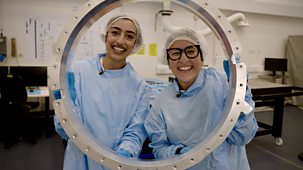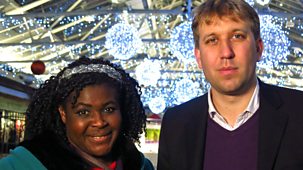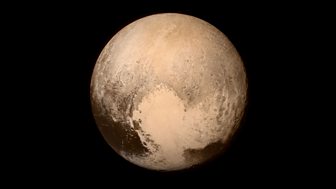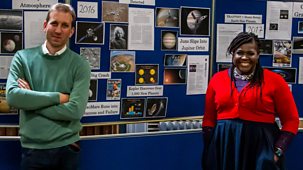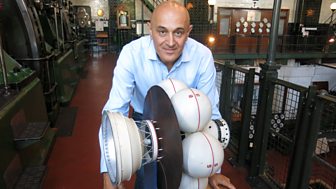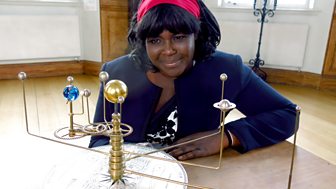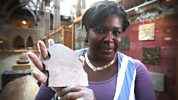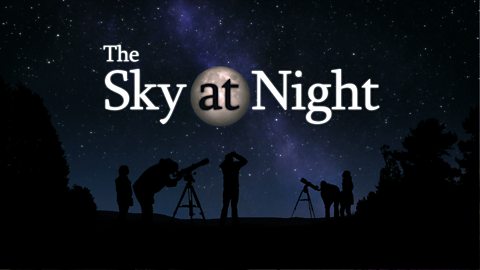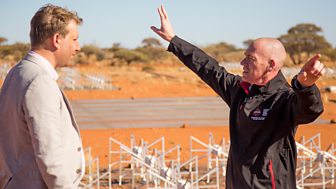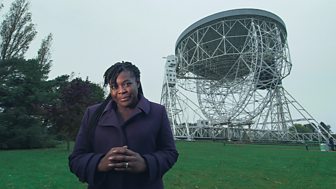
In the Blink of an Eye
We're used to thinking that the universe operates on timescales of millions or even billions of years, where change happens with imperceptible slowness. But now we've discovered a whole catalogue of events that happen over much shorter times - seconds or even milliseconds. And these sudden, transient occurrences are among the most mysterious, powerful and destructive events in the universe. Observing them has raised exciting new questions about the way the universe works.\n\nThis month The Sky at Night explores this world of transient phenomena. We hear more about the explosive event that created the recently detected gravitational wave - the collision of two neutron stars. And Chris spends 24 hours at the SWIFT space telescope base in Leicester in an attempt to detect a gamma ray burst - the most powerful and extreme short-term event known.\n\nMaggie goes to meet the team that are searching for the mysterious, barely understood transient phenomena called fast radio bursts. And Lucie Green reveals that some important short-term phenomena can occur much closer to home too.\n\nAstronomy used to be about staring up at the unchanging sky, so this search for transitory objects is truly revolutionary. It's time to enter the spectacular world of astronomy that takes place... in the blink of an eye...
Source: BBC 4
Most recent episodes of The Sky at Night
The Sky At Night
Asteroid Strike?
The team explore one of the biggest stories in space news, the ‘city killer’ asteroid 2024 YR4. First observed on 27 December 2024, it soon became one of the biggest ...
17-04-2025
BBC 4
The Sky At Night
Ancestral Skies
This month, The Sky at Night teams up with BBC Ideas to discover the secrets of archaeology and astronomy and to reflect on our ancestral skies. \n\nThroughout history and acros ...
14-11-2024
BBC 4
The Sky At Night
Question Time Special
Get ready for The Sky at Night’s annual Question Time Special, where viewers get the opportunity to ask the questions they have always wanted answered about our universe.\ ...
08-10-2024
BBC 4
The Sky At Night
2075: Our Place In Space
The Sky at Night is embarking on a journey into the future as we explore how space will revolutionise life on Earth over the next 50 years. As humanity's reach extends into the ...
11-09-2024
BBC 4
The Sky At Night
Nicky, Nasa And The Next Frontier
In this Sky at Night special, the team talk to Dr Nicola Fox, NASA’s head of science, whose life began in the UK.\n\nPresenter Chris Lintott chats to Nicky about her early ...
15-08-2024
BBC 4
The Sky At Night
Webb Telescope: The Story So Far
In July 2022, the James Webb Space Telescope released its first images. They were visually stunning, and it was clear they provided more detail of stars, galaxies and planets th ...
11-07-2024
BBC 4
The Sky At Night
Cosmic Ghosts
This month, The Sky at Night has a spooky twist. Across the universe, there are hidden objects that we can’t see, but astronomers and scientists still believe they’r ...
13-06-2024
BBC 4
The Sky At Night
Hiding In Starlight
Total solar eclipses, like the one seen last month in North America, allow us to see details of the Sun that can’t be seen at any other time. So, this month, The Sky at Ni ...
16-05-2024
BBC 4
The Sky At Night
Space Rock Return
The Sky at Night is back for a brand new series, and this month it is delving into Nasa’s OSIRIS-REx mission, which last year brought back a sample from the near-Earth ast ...
11-04-2024
BBC 4
Most popular episodes of The Sky at Night
The Sky At Night
Asteroid Strike?
The team explore one of the biggest stories in space news, the ‘city killer’ asteroid 2024 YR4. First observed on 27 December 2024, it soon became one of the biggest ...
17-04-2025
BBC 4
The Sky At Night
The Sky At Day
The British weather is often the enemy of stargazers up and down the country. A forecast of a couple of hours of cloud cover will disappoint even the most determined amateur ast ...
13-07-2022
BBC 4
The Sky At Night
The Brightest Star
The team explore stargazing in the daytime, show how seasons change on other planets across the solar system and examine what makes the sun special.
13-07-2014
BBC 4
The Sky At Night
The State Of Astronomy
The Sky at Night looks back at the last ten years of astronomy and ponders the most significant milestones and revelations. With the help of six distinguished astronomers, Chris ...
13-12-2020
BBC 4
The Sky At Night
Impacts
The team looks at the cosmic impacts which have shaped the universe around us, from asteroids crashing into the surface of the moon to galaxies colliding with each other.
15-06-2014
BBC 4
The Sky At Night
Guides: 2. Galaxies
Galaxies are the building blocks of the universe. Our solar system sits inside a huge galaxy that we call the Milky Way - home to as many as 300 billion stars. But the Milky Way ...
11-08-2019
BBC 4
The Sky At Night
Outback Astronomy
In February 2018, news broke that astronomers had seen the cosmic dawn - the moment when stars first formed, flooding the universe with light. What's remarkable is that this inc ...
12-07-2018
BBC 4





